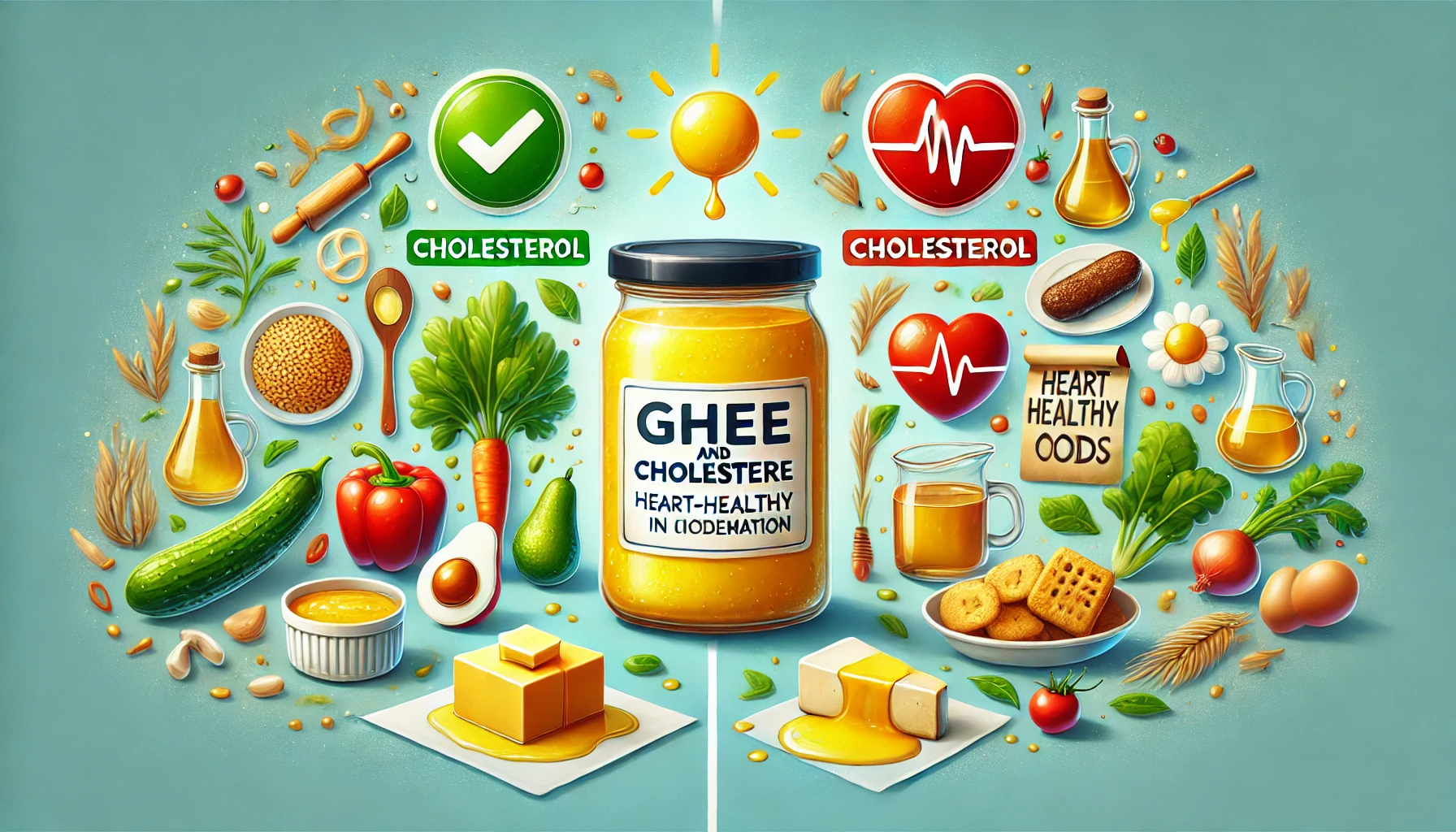- You have no items in your shopping cart
- Subtotal: ₹0.00

Ghee and Cholesterol: What Doctors Aren’t Telling You
Ghee, a staple in many Indian households, has long been cherished for its rich flavor and numerous health benefits. However, over the years, it has also faced significant scrutiny due to its perceived role in raising cholesterol levels and contributing to heart disease. This has led many people to avoid ghee, considering it unhealthy for their cardiovascular system.
But does ghee really raise cholesterol? Or is this just another nutritional myth that needs debunking? In this comprehensive blog post, we will explore the myths and facts surrounding ghee and cholesterol, relying on scientific research and credible sources. You’ll discover that moderate consumption of pure ghee may not only be safe for your heart but may even offer several health benefits.
What Is Ghee?
Before diving into the relationship between ghee and cholesterol, let’s first understand what ghee is.
Ghee is a type of clarified butter that has been a central ingredient in Indian and Ayurvedic cooking for thousands of years. It is made by simmering butter to remove the milk solids and water, leaving behind a golden liquid fat rich in flavor and nutrients. Ghee has a high smoke point, making it ideal for cooking at higher temperatures, and is also valued for its long shelf life without the need for refrigeration.
The nutritional profile of ghee includes:
- Saturated fats: Ghee contains approximately 62% saturated fat.
- Monounsaturated fats (MUFAs): About 29% of the fat in ghee is monounsaturated.
- Polyunsaturated fats (PUFAs): Ghee contains around 4% polyunsaturated fats.
- Vitamins: Ghee is rich in fat-soluble vitamins such as A, D, E, and K.
Given its high saturated fat content, ghee has often been blamed for raising cholesterol levels and contributing to heart disease. However, recent research suggests that the relationship between saturated fats, cholesterol, and heart disease may not be as straightforward as once thought.
The Myth: Ghee Raises Cholesterol and Contributes to Heart Disease
For decades, health experts have warned against the consumption of saturated fats due to their association with high cholesterol levels and an increased risk of heart disease. Since ghee is rich in saturated fats, it has often been lumped into the category of “unhealthy” foods, with many believing that it can cause cholesterol levels to spike and damage cardiovascular health.
This myth is rooted in the outdated idea that all saturated fats are harmful to heart health. However, recent studies have challenged this notion, revealing that not all saturated fats are created equal, and some may even offer health benefits when consumed in moderation.
The Facts: Ghee Can Be Beneficial for Cholesterol Levels
While it’s true that consuming excessive amounts of any fat, including ghee, can lead to weight gain and associated health problems, moderate consumption of pure ghee does not necessarily raise cholesterol levels or contribute to heart disease. In fact, several studies suggest that ghee may have a neutral or even positive effect on cholesterol and heart health.
1. Ghee and HDL Cholesterol (Good Cholesterol)
Ghee has been shown to have a positive impact on high-density lipoprotein (HDL) cholesterol, also known as “good” cholesterol. HDL cholesterol is responsible for carrying excess cholesterol away from the arteries and back to the liver, where it can be processed and removed from the body. Higher levels of HDL cholesterol are associated with a reduced risk of heart disease.
A study published in the Journal of Clinical & Diagnostic Research in 2010 investigated the effects of ghee consumption on cholesterol levels in a group of healthy men. The researchers found that moderate consumption of ghee significantly increased HDL cholesterol levels without raising levels of low-density lipoprotein (LDL) cholesterol, also known as “bad” cholesterol. This suggests that ghee may support cardiovascular health by promoting a healthier lipid profile.
2. Ghee and LDL Cholesterol (Bad Cholesterol)
Low-density lipoprotein (LDL) cholesterol is often referred to as “bad” cholesterol because it can accumulate in the walls of the arteries, leading to plaque formation and an increased risk of atherosclerosis, heart attacks, and strokes. However, not all LDL particles are harmful—small, dense LDL particles are more likely to contribute to heart disease, while larger, more buoyant LDL particles are considered less harmful.
A study conducted at AIIMS (All India Institute of Medical Sciences) in New Delhi found that ghee consumption did not increase the levels of small, dense LDL particles, which are more strongly associated with heart disease. In fact, the study concluded that ghee may actually reduce the risk of cardiovascular disease by increasing the size of LDL particles and reducing the overall atherogenic risk.
3. Ghee’s Impact on Triglycerides
Triglycerides are a type of fat found in the blood, and high levels of triglycerides are a known risk factor for heart disease. Elevated triglyceride levels are often associated with an increased risk of atherosclerosis and other cardiovascular conditions.
A study published in the Journal of Clinical Lipidology found that ghee consumption did not lead to a significant increase in triglyceride levels. In fact, when consumed in moderate amounts, ghee may help reduce triglyceride levels due to its content of short-chain and medium-chain fatty acids (SCFAs and MCFAs), which are quickly metabolized by the body for energy rather than being stored as fat.
The Science Behind Ghee’s Health Benefits
There is a growing body of scientific evidence that supports the idea that ghee, when consumed in moderation, can have several positive effects on health, including heart health. Let’s explore some of the key health benefits of ghee and how they relate to cholesterol levels.
1. Rich in Conjugated Linoleic Acid (CLA)
Ghee is an excellent source of conjugated linoleic acid (CLA), a type of fatty acid that has been linked to numerous health benefits, including weight loss, improved immune function, and a reduced risk of heart disease. CLA has been shown to help reduce body fat, lower blood pressure, and improve cholesterol levels by increasing HDL cholesterol and lowering LDL cholesterol.
A study published in the American Journal of Clinical Nutrition found that consuming foods rich in CLA, such as ghee, can help reduce the risk of heart disease by improving cholesterol levels and reducing inflammation.
2. Anti-Inflammatory Properties
Chronic inflammation is a major contributor to the development of heart disease, as it can damage blood vessels and promote the formation of arterial plaque. Ghee contains several anti-inflammatory compounds, including butyrate, a short-chain fatty acid that has been shown to reduce inflammation in the body.
Research published in the Journal of Medicinal Food found that ghee consumption helped reduce levels of pro-inflammatory markers in the blood, suggesting that it may help protect against chronic diseases, including heart disease.
3. Supports Gut Health
A healthy gut is essential for overall well-being, and there is growing evidence that the health of the gut microbiome plays a crucial role in regulating cholesterol levels and heart health. Ghee contains butyric acid, a type of short-chain fatty acid that supports the health of the gut lining and promotes the growth of beneficial bacteria in the intestines.
By improving gut health, ghee may help regulate cholesterol metabolism and reduce the risk of heart disease. A study published in the World Journal of Gastroenterology found that butyric acid helped improve gut health and reduce inflammation, both of which are important for maintaining healthy cholesterol levels.
4. High in Antioxidants
Ghee is rich in fat-soluble vitamins, including vitamins A, D, E, and K, all of which have potent antioxidant properties. Antioxidants help protect the body from oxidative stress and free radical damage, which can contribute to the development of heart disease.
Vitamin E, in particular, has been shown to improve cholesterol levels by preventing the oxidation of LDL cholesterol. Oxidized LDL cholesterol is more likely to contribute to the formation of arterial plaque, so consuming antioxidant-rich foods like ghee can help reduce the risk of heart disease.
Myths Surrounding Ghee and Cholesterol
Despite the evidence supporting the health benefits of ghee, several myths about its impact on cholesterol persist. Let’s debunk some of the most common misconceptions about ghee and cholesterol.
Myth 1: All Saturated Fats Are Bad for Cholesterol Levels
For many years, saturated fats were vilified for their association with high cholesterol and heart disease. However, recent research has shown that not all saturated fats are created equal. The type of saturated fat found in ghee, known as short-chain and medium-chain fatty acids (SCFAs and MCFAs), is metabolized differently by the body compared to long-chain saturated fats found in processed foods.
Unlike long-chain fatty acids, which are more likely to be stored as fat, SCFAs and MCFAs are quickly converted into energy by the liver and do not raise cholesterol levels in the same way. In fact, these fats may help improve cholesterol levels by increasing HDL cholesterol and reducing LDL cholesterol.
Myth 2: Ghee Should Be Avoided by People with High Cholesterol
Many people with high cholesterol are advised to avoid ghee due to its high saturated fat content. However, as we’ve seen, moderate consumption of ghee may actually have a neutral or positive effect on cholesterol levels. Ghee can increase HDL cholesterol and may help reduce LDL cholesterol by promoting the formation of larger, less harmful LDL particles.
For people with high cholesterol, the key is to consume ghee in moderation as part of a balanced diet that includes plenty of fruits, vegetables, whole grains, and other heart-healthy foods.
Myth 3: Ghee Is Unhealthy for the Heart
This is perhaps the most pervasive myth about ghee. While it’s true that consuming excessive amounts of any fat can contribute to weight gain and associated health problems, moderate consumption of ghee does not increase the risk of heart disease. In fact, ghee contains several compounds, including CLA and butyric acid, that support heart health by reducing inflammation, improving cholesterol levels, and protecting against oxidative stress.
How Much Ghee Is Safe to Consume?
Like any food, ghee should be consumed in moderation. The American Heart Association (AHA) recommends that saturated fat intake should make up no more than 5-6% of your total daily calories. For someone eating a 2,000-calorie diet, this translates to about 13 grams of saturated fat per day.
Since ghee is high in saturated fat, it’s important to be mindful of portion sizes. One tablespoon of ghee contains about 9 grams of saturated fat, so it’s best to limit consumption to 1-2 tablespoons per day as part of a balanced diet.
Conclusion: Ghee and Cholesterol – The Verdict
The relationship between ghee and cholesterol is more nuanced than the old narrative suggests. While ghee is high in saturated fat, the specific types of fats it contains—SCFAs and MCFAs—are metabolized differently by the body and may actually help improve cholesterol levels when consumed in moderation. Additionally, ghee is rich in beneficial compounds like CLA, butyric acid, and antioxidants, all of which support heart health.
Rather than being a food to avoid, ghee can be a valuable addition to a heart-healthy diet when used in moderation. By dispelling the myths surrounding ghee and cholesterol, we can better appreciate the health benefits of this traditional, nutrient-dense fat.
Using GheeStore’s Pure Ghee for Better Health
If you’re looking for high-quality, lab-certified pure ghee, look no further than GheeStore. Our ghee is made using traditional methods to ensure that it retains its natural nutrients and health benefits. Whether you’re using it for cooking, baking, or simply enjoying it as a topping, GheeStore’s ghee is the perfect choice for those looking to enjoy the health benefits of this ancient superfood.
Visit GheeStore today to explore our range of pure ghee and cold-pressed oils, and start incorporating this healthy fat into your daily diet for better heart health and overall wellness.



